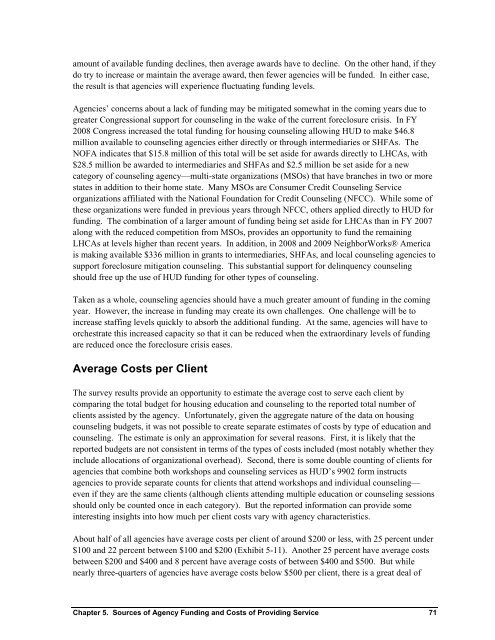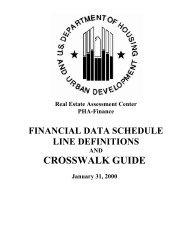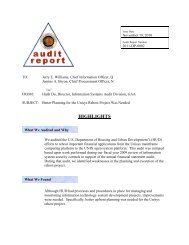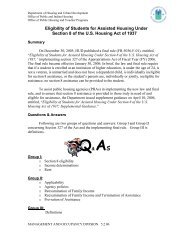Housing Counseling Process Evaluation and Design of ... - HUD User
Housing Counseling Process Evaluation and Design of ... - HUD User
Housing Counseling Process Evaluation and Design of ... - HUD User
You also want an ePaper? Increase the reach of your titles
YUMPU automatically turns print PDFs into web optimized ePapers that Google loves.
amount <strong>of</strong> available funding declines, then average awards have to decline. On the other h<strong>and</strong>, if they<br />
do try to increase or maintain the average award, then fewer agencies will be funded. In either case,<br />
the result is that agencies will experience fluctuating funding levels.<br />
Agencies’ concerns about a lack <strong>of</strong> funding may be mitigated somewhat in the coming years due to<br />
greater Congressional support for counseling in the wake <strong>of</strong> the current foreclosure crisis. In FY<br />
2008 Congress increased the total funding for housing counseling allowing <strong>HUD</strong> to make $46.8<br />
million available to counseling agencies either directly or through intermediaries or SHFAs. The<br />
NOFA indicates that $15.8 million <strong>of</strong> this total will be set aside for awards directly to LHCAs, with<br />
$28.5 million be awarded to intermediaries <strong>and</strong> SHFAs <strong>and</strong> $2.5 million be set aside for a new<br />
category <strong>of</strong> counseling agency—multi-state organizations (MSOs) that have branches in two or more<br />
states in addition to their home state. Many MSOs are Consumer Credit <strong>Counseling</strong> Service<br />
organizations affiliated with the National Foundation for Credit <strong>Counseling</strong> (NFCC). While some <strong>of</strong><br />
these organizations were funded in previous years through NFCC, others applied directly to <strong>HUD</strong> for<br />
funding. The combination <strong>of</strong> a larger amount <strong>of</strong> funding being set aside for LHCAs than in FY 2007<br />
along with the reduced competition from MSOs, provides an opportunity to fund the remaining<br />
LHCAs at levels higher than recent years. In addition, in 2008 <strong>and</strong> 2009 NeighborWorks® America<br />
is making available $336 million in grants to intermediaries, SHFAs, <strong>and</strong> local counseling agencies to<br />
support foreclosure mitigation counseling. This substantial support for delinquency counseling<br />
should free up the use <strong>of</strong> <strong>HUD</strong> funding for other types <strong>of</strong> counseling.<br />
Taken as a whole, counseling agencies should have a much greater amount <strong>of</strong> funding in the coming<br />
year. However, the increase in funding may create its own challenges. One challenge will be to<br />
increase staffing levels quickly to absorb the additional funding. At the same, agencies will have to<br />
orchestrate this increased capacity so that it can be reduced when the extraordinary levels <strong>of</strong> funding<br />
are reduced once the foreclosure crisis eases.<br />
Average Costs per Client<br />
The survey results provide an opportunity to estimate the average cost to serve each client by<br />
comparing the total budget for housing education <strong>and</strong> counseling to the reported total number <strong>of</strong><br />
clients assisted by the agency. Unfortunately, given the aggregate nature <strong>of</strong> the data on housing<br />
counseling budgets, it was not possible to create separate estimates <strong>of</strong> costs by type <strong>of</strong> education <strong>and</strong><br />
counseling. The estimate is only an approximation for several reasons. First, it is likely that the<br />
reported budgets are not consistent in terms <strong>of</strong> the types <strong>of</strong> costs included (most notably whether they<br />
include allocations <strong>of</strong> organizational overhead). Second, there is some double counting <strong>of</strong> clients for<br />
agencies that combine both workshops <strong>and</strong> counseling services as <strong>HUD</strong>’s 9902 form instructs<br />
agencies to provide separate counts for clients that attend workshops <strong>and</strong> individual counseling—<br />
even if they are the same clients (although clients attending multiple education or counseling sessions<br />
should only be counted once in each category). But the reported information can provide some<br />
interesting insights into how much per client costs vary with agency characteristics.<br />
About half <strong>of</strong> all agencies have average costs per client <strong>of</strong> around $200 or less, with 25 percent under<br />
$100 <strong>and</strong> 22 percent between $100 <strong>and</strong> $200 (Exhibit 5-11). Another 25 percent have average costs<br />
between $200 <strong>and</strong> $400 <strong>and</strong> 8 percent have average costs <strong>of</strong> between $400 <strong>and</strong> $500. But while<br />
nearly three-quarters <strong>of</strong> agencies have average costs below $500 per client, there is a great deal <strong>of</strong><br />
Chapter 5. Sources <strong>of</strong> Agency Funding <strong>and</strong> Costs <strong>of</strong> Providing Service 71
















